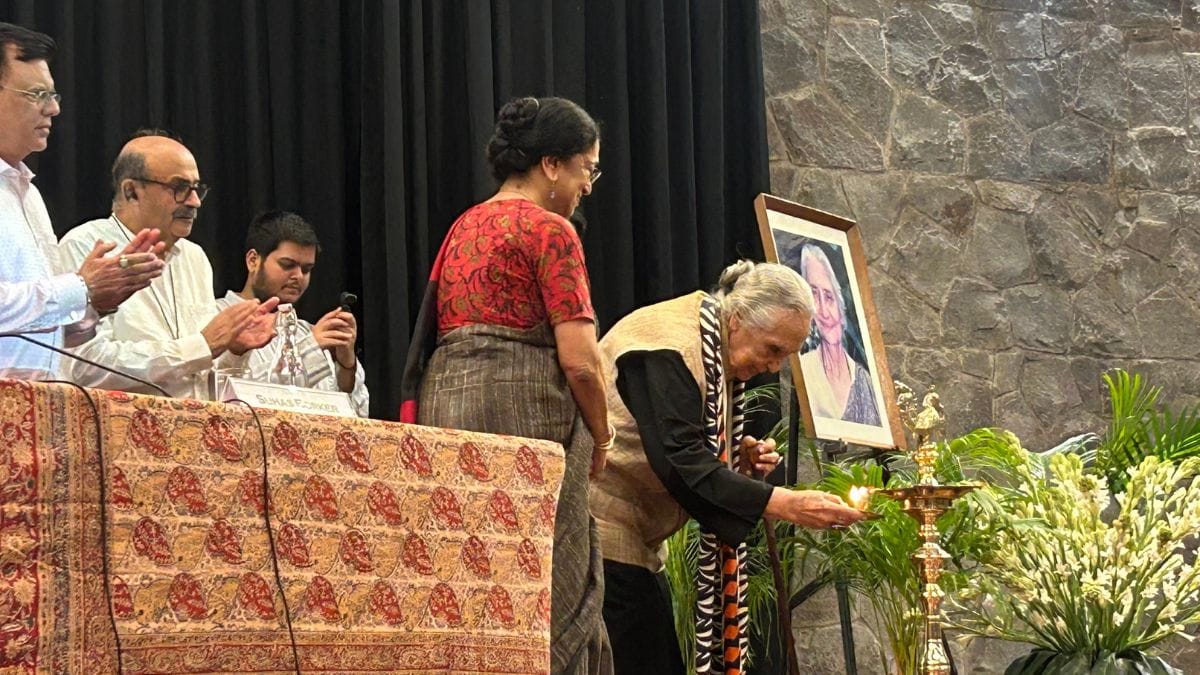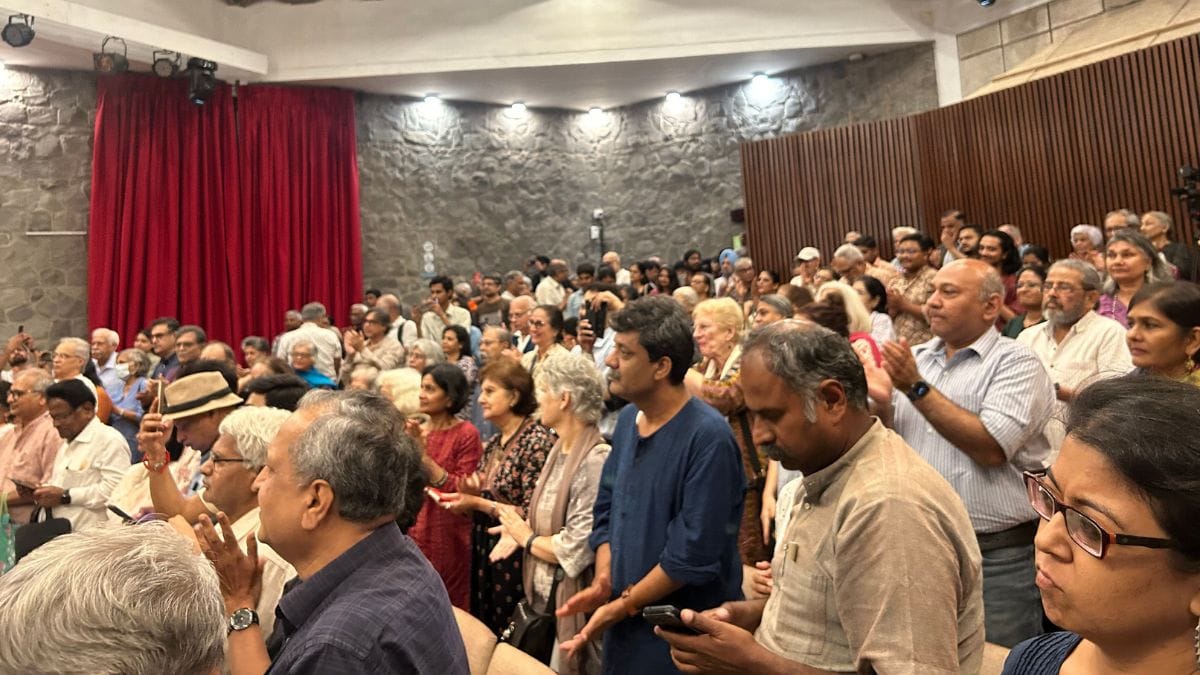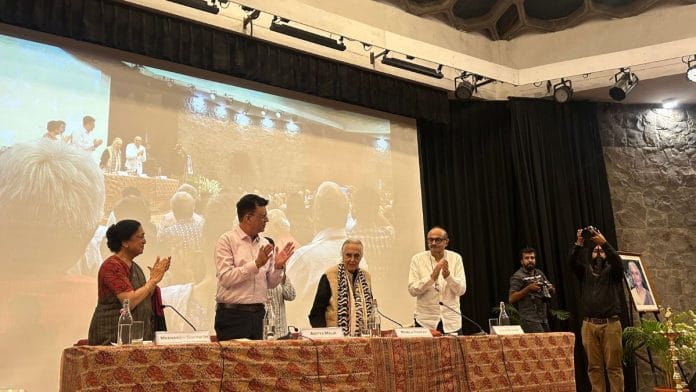New Delhi: Historian Romila Thapar doesn’t do much public speaking these days. People either speak for her or against her in public debates. But at 93, she is watching everything that goes on—from school textbook rationalisation and NEP to the dangers of relying on history that is not empirically backed.
And she has many, many questions. At the third Kapila Vatsyayan Memorial Lecture at the India International Centre Tuesday, her one-hour speech was nothing short of a ‘Romila Thapar ki Paathshala’ for today’s India. The title of the talk was: “The Present Colonises Our Past: The Future Forsaken?”
Her scathing questions kept coming down like a hammer.
Can nationalism be qualified by a religious identity? Can a society as diverse as India be reduced to a single uniform heritage? Will we still be able to nurture a society whose parameters are open to debate and discussion? What will happen to Hinduism’s inherent pluralism, its coexistence of diverse sects that give it richness? Will it continue to uphold its hierarchies, or begin to question them? How can we return to exploring history thoughtfully and intelligently, understanding the past more closely, connecting it to the present, and imagining a viable future?
In her introduction to Thapar, former principal of Lady Sri Ram College for Women, Meenakshi Gopinath said: “The task of a historian is not only to recover the past but also defend the integrity of knowledge.”
The turnout at the talk was so overwhelming that once the main hall was filled to the brim, people squatted on the floor on the aisles, and an adjoining hall had to be opened where the lecture was streamed live for those who couldn’t find a seat. IIC president Shyam Saran repeatedly urged people to vacate the aisles for safety.

Repetition of colonial ideas
Romila Thapar began the talk with how Indian history was framed between two colonial constructs: the Aryan race theory and the Two-Nation theory. Both, she noted, “were deeply ingrained and initially shaped Indian history.”
The lecture was chaired by Gopinath, while IIC committee member Suhas Borkar and social sciences professor Aditya Malik also spoke at the event.
Tracing the genealogy of these colonial frames, Thapar explained how the colonial scholars positioned Aryans as a “superior race” of migrants from Central Asia, laying the foundation for upper-caste claims to cultural dominance. “Upper-caste Hindus claim descent and cultural origins, and Hinduism claims its roots from the Aryans,” she pointed out.
Similarly, she revisited Scottish historian James Mill’s influential The History of British India (1817), where the Two-Nation Theory took shape. Mill had argued that India consisted of two separate nations, Hindus and Muslims. This, Thapar explained, entrenched a communal lens through which the past came to be read, turning Hindu-Muslim conflict into the defining theme of the second millennium.
“This theory ignores the fact that a nation depends on drawing diverse people together, whereas religion segregates them according to belief,” she said.
Thapar reminded her audience that while professional historians had dismantled such interpretations more than half a century ago, both theories continue to be revived in public discourse and “propagated in Hindutva ideology”.
The veteran historian was blunt about what this revival means. “Let me briefly summarise the Hindutva version, which is now all-pervasive… The rightful future of India, it is argued, lies in its being a Hindu Rashtra. It is maintained that the culture of India has always been a Hindu culture.”

For Thapar, this is not decolonisation of history but a repetition of colonial ideas, even as the postcolonial historiography has been dismissed as “Marxist”. The audience loudly sniggered.
She explained that in today’s India, people are being told the goal is to “decolonise” the past, but what that actually means remains unclear. While professional historians have long worked to dismantle colonial readings, she said, those ideas are now being recycled and promoted as ‘authentic’.
Also read: ‘Dangerous anti-democratic shift’—former diplomat Shyam Saran issues warning at book launch
Missing Mughals
Thapar seamlessly moved from one historical chapter to the next, covering lessons from the past and their teaching today.
She highlighted sections of history that are being “deliberately deleted” under what the NCERT calls the rationalisation of the syllabus, often justified as making the curriculum easier. She spoke of how the Mughal era is being eclipsed.
“It makes the subject opaque and difficult to follow, not to mention the explanation for the huge gaps… What answer will be given to students if they ask who the Marathas were fighting?” she said, drawing laughter from the audience.
“Did nothing important happen in the two centuries from the 16th to the 18th, the centuries that have been omitted?” she added.
At the university level, the new changes have weakened intellectual challenge. Reading lists are pared down, visiting scholars’ lectures are restricted, and academic freedom is under threat.
She also noted that some students from Jawaharlal Nehru University (JNU) have been arrested for criticising authorities, and remain in jail without trial. “Intellectually purposeful education requires thinking with freedom. Speech can be silenced, but thought cannot be instilled,” Thapar said.
Pointing toward the law of sedition, the banning of books, and the arrest of those critical of authority, Thapar said that these measures draw inspiration from the “colonial encounter” that continues until today.
Thapar said that if the cultural identity of India is going to be moulded by inheritance from the past, then at least the history, as taught and read, needs to be reliable and accurate.
“This requires ensuring that history is not being manipulated for political or other reasons. This is where education becomes crucial,” she said.
Also read: ‘In an ideal world, there would be 10-15 Muslim women in each Parliament’: Omar Abdullah
Questions for India’s future
Accepting the Two-Nation Theory, Thapar warned, would make Hindus “the primary citizens,” relegating non-Hindus to “secondary status.” She added that singular majoritarianism is fundamentally at odds with democracy.
Linking this to her field, Thapar noted that professional history is being replaced in ways that threaten to erase India’s pluralism.
Calling it the “cultural idiom of a dominant community”, Thapar questioned whether only one version of the past will remain, with all others dismissed. These concerns, she underlined, go beyond Indian history, for their answers could redefine the essence of India’s culture and religions.
She explained that the history of religion in India has always reflected cultural interactions and evolving beliefs, from Harappan and megalithic practices to Vedic sacrificial rituals to Puranic worship of new deities to the efflorescence of diverse bhakti traditions across regions.
There was a time after Independence, said the historian, when tolerance and non-violence were thought of as Indian values. Today, these words are not even heard in public discourse.
“Has the future been forsaken? Can we retrieve the anti-colonial vision of India as an independent, secular, democratic society, rooted in freedom of thought, debate, consent, and dissent?”
(Edited by Prasanna Bachchhav)







Throw her in the bin . She has damaged s generation. Today’s India is different. We don’t need this people. We know what we want.